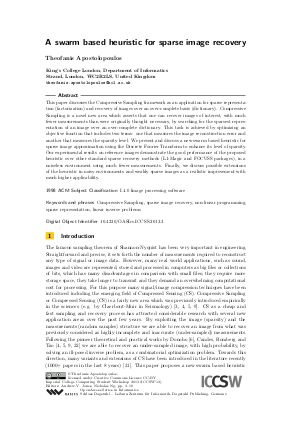A swarm based heuristic for sparse image recovery
Author Theofanis Apostolopoulos
-
Part of:
Volume:
2013 Imperial College Computing Student Workshop (ICCSW 2013)
Part of: Series: Open Access Series in Informatics (OASIcs) - License:
 Creative Commons Attribution 3.0 Unported license
Creative Commons Attribution 3.0 Unported license
- Publication Date: 2013-10-14
File

PDF
OASIcs.ICCSW.2013.3.pdf
- Filesize: 0.74 MB
- 8 pages
Document Identifiers
Subject Classification
Keywords
- Compressive Sampling
- sparse image recovery
- non-linear programming
- sparse repre sentation
- linear inverse problems
Metrics
- Access Statistics
-
Total Accesses (updated on a weekly basis)
0PDF Downloads0Metadata Views
Abstract
This paper discusses the Compressive Sampling framework as an application for sparse representation (factorization) and recovery of images over an over-complete basis (dictionary). Compressive Sampling is a novel new area which asserts that one can recover images of interest, with much fewer measurements than were originally thought necessary, by searching for the sparsest representation of an image over an over-complete dictionary. This task is achieved by optimizing an objective function that includes two terms: one that measures the image reconstruction error and another that measures the sparsity level. We present and discuss a new swarm based heuristic for sparse image approximation using the Discrete Fourier Transform to enhance its level of sparsity. Our experimental results on reference images demonstrate the good performance of the proposed heuristic over other standard sparse recovery methods (L1-Magic and FOCUSS packages), in a noiseless environment using much fewer measurements. Finally, we discuss possible extensions of the heuristic in noisy environments and weakly sparse images as a realistic improvement with much higher applicability.
Cite As Get BibTex
Theofanis Apostolopoulos. A swarm based heuristic for sparse image recovery. In 2013 Imperial College Computing Student Workshop. Open Access Series in Informatics (OASIcs), Volume 35, pp. 3-10, Schloss Dagstuhl – Leibniz-Zentrum für Informatik (2013)
https://doi.org/10.4230/OASIcs.ICCSW.2013.3
BibTex
@InProceedings{apostolopoulos:OASIcs.ICCSW.2013.3,
author = {Apostolopoulos, Theofanis},
title = {{A swarm based heuristic for sparse image recovery}},
booktitle = {2013 Imperial College Computing Student Workshop},
pages = {3--10},
series = {Open Access Series in Informatics (OASIcs)},
ISBN = {978-3-939897-63-7},
ISSN = {2190-6807},
year = {2013},
volume = {35},
editor = {Jones, Andrew V. and Ng, Nicholas},
publisher = {Schloss Dagstuhl -- Leibniz-Zentrum f{\"u}r Informatik},
address = {Dagstuhl, Germany},
URL = {https://drops.dagstuhl.de/entities/document/10.4230/OASIcs.ICCSW.2013.3},
URN = {urn:nbn:de:0030-drops-42655},
doi = {10.4230/OASIcs.ICCSW.2013.3},
annote = {Keywords: Compressive Sampling, sparse image recovery, non-linear programming, sparse repre sentation, linear inverse problems}
}
